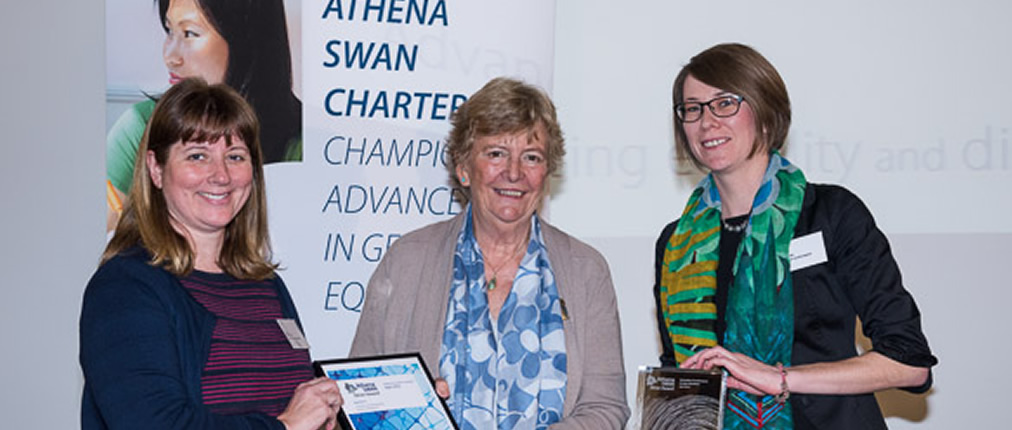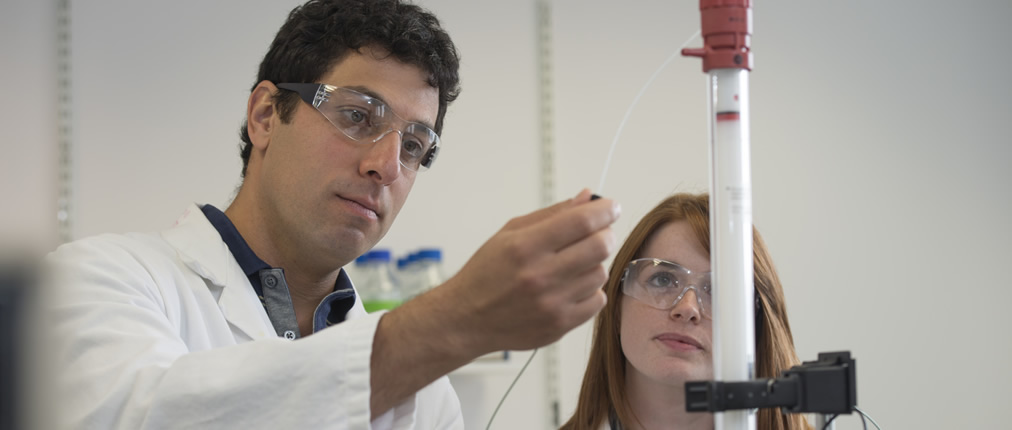Hartley News Online Your alumni and supporter magazine
In 2015 Chemistry and Medicine became the first Southampton departments to receive Athena SWAN silver awards in recognition of their continuing commitment to gender equality. Find out how they achieved success and how Athena SWAN is helping women to fulfil their career potential and creating a more inclusive culture in both disciplines.
Gender inequality is a big issue within UK higher education, with women underrepresented particularly in senior academic roles. Figures produced by the Equality Challenge Unit, which runs Athena SWAN, show a ‘leaky pipeline’ effect, with the proportion of women decreasing at each career stage.
Only 20 per cent of professors are female; this falls to 17 per cent for full-time professor roles in science, engineering and technology subjects.
With fewer female role models to inspire future generations of women and an ongoing perception that a successful academic career involves long, inflexible hours that are incompatible with family commitments, a vicious cycle is created – one that Athena SWAN aims to break. “These factors can put women off pursuing an academic career,” says Senior Research Fellow Dr Lynda Brown, who led Chemistry’s Athena SWAN silver submission. “Anything we can do to restore the balance is absolutely vital.”
University-wide action
Recognising the challenge, Southampton was among the first universities to sign up to Athena SWAN, a nationwide initiative that encourages universities and colleges to identify and remove barriers that may be preventing women from rising through the ranks. Initially focusing on academic careers in science, technology, engineering, maths and medicine, it has expanded to include a wider range of subject areas and to encompass professional and support roles.
Having achieved bronze in 2009, the University is looking to apply for a silver award in spring this year. Activities such as the Springboard women’s career development programme, mentoring, and staff networks such as WiSET (Women in Science, Engineering and Technology) and the Parents’ and Carers’ Network, are all playing a part.
Alongside these University-wide initiatives, several faculties and academic units have signed up to the scheme. Chemistry and Medicine gained bronze awards in 2013 and are now proud to have succeeded at silver level.
Reviewing policy and practice
The Athena SWAN process involves looking at departmental data, gathering staff feedback and reviewing policies and work practices to identify areas for improvement. An action plan is developed and implemented, with progress monitored along the way.
In Chemistry and Medicine, this has led to changes ranging from the introduction of core hours for departmental activities to avoid excluding staff with childcare responsibilities, to raising the profile of senior female academics. There have also been changes to ensure recruitment and promotion processes don’t put women at a disadvantage. These include encouraging women to access Springboard and mentoring programmes, making unconscious bias training mandatory for all appointment panel members and ensuring panels always include women.
These changes are making a tangible difference. Dr Nicola Englyst, Associate Professor, leads Medicine’s longstanding mentoring scheme. She was also part of the first job share at lectureship level in Medicine, which enabled her and a colleague to further their careers while managing family commitments. “When I was a postdoctoral researcher there were very few female role models, so as a woman it was difficult to see how you could progress. That has really changed over the last few years. Women have more confidence to go for promotion – they’re not being promoted ahead of men, but are better equipped for the process.”
And the evidence is not just anecdotal.
Figures show that the number of female academics applying for promotion in Medicine rose from four in 2010/11 to 18 in 2014/15, with success rates increasing from 50 per cent to 78 per cent in the same period.
Benefits across the board
Another area that both departments scrutinised was maternity leave. “One issue in Chemistry is that when you are pregnant you can’t work in a lab, so there’s an impact even before the maternity leave stage,” Lynda explains. “This can cause difficulties if it means you can’t fulfil funders’ requirements, for example. To overcome this we’ve put a new policy in place which enables academics to apply internally for funds to meet the cost of staff cover or extend the contract beyond the term of the grant.”
But while Athena SWAN focuses on gender-related issues, the benefits it brings aren’t exclusive to women. Ali Tavassoli, Professor of Chemical Biology, says: “I recently became a father, and the flexibility we have in place here has allowed me to get my job done but also take time when I need to, to take my son to medical appointments and so on. I’ve also personally benefited from the mentoring scheme.”
Ali adds:
Chemistry is a fabulous place to work and we ranked sixth in the UK for research intensity in the Research Excellence Framework. So creating a more inclusive environment doesn’t mean compromising on excellence – in fact you’re allowing people to achieve their best.
Enhancing the pipeline
As well as levelling the playing field for current staff, Athena SWAN aims to improve the pipeline of women going into academic careers. Chemistry is doing this through outreach activities with schools to inspire girls to take up science, and by reviewing its undergraduate recruitment. “We’ve made simple changes, such as ensuring female staff are well represented in our undergraduate recruitment literature and having a balance of male and female volunteers at open days,” says Lynda.
“The impact is gradual but we are making progress, with women making up 45 per cent of undergraduates this year compared to 39 per cent last year.”
Commitment from the top
For both Medicine and Chemistry, a clear commitment from the senior leadership was a key factor for success. Adrian Reyes-Hughes, Head of Faculty Operations, helped to manage Medicine’s silver submission. He says: “It was important to send out the message that this was a faculty commitment that we wanted everyone to sign up to. We made sure each academic unit included Athena SWAN on management meeting agendas, and set up mini action groups within each academic unit with a champion to drive the scheme forward. You may get negative reactions, but when they surface you can discuss them with a view to changing behaviours. Behaviour change is key – you can write the words, but if people don’t commit to them nothing happens.”
Being able to demonstrate progress is also crucial for a successful submission. “You can’t start thinking about this too early,” says Lynda. “It’s important to gather evidence as you go along; every time you make a change you need to find out whether it has made a positive impact.”
Future plans
Looking to the future, both departments aim to build on progress and broaden the reach of their equality and diversity work. Adrian says: “Athena SWAN has opened up the discussion about inclusion, and we now have a dedicated equality and diversity champion who is looking at wider issues such as age and disability.”
Lynda adds: “In Chemistry we want to make sure our Athena SWAN activity includes not just academic staff but students and technical and administrative staff too. It’s all about making Chemistry a great place to work for everyone.”


